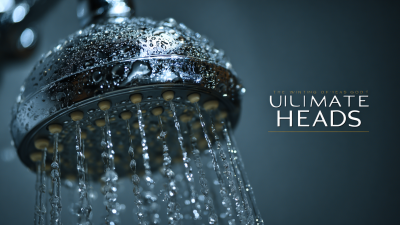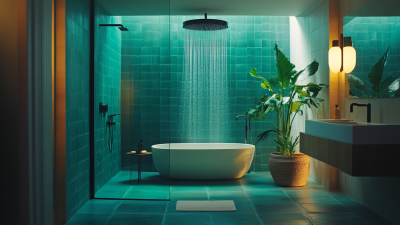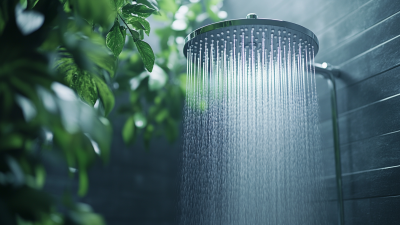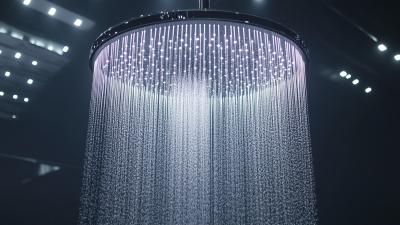
7 Amazing Benefits of Head Showers You Never Knew About
In recent years, the popularity of head showers has surged, as more people discover the profound benefits of incorporating this simple yet effective fixture into their daily routines. According to a report from the World Health Organization, approximately 80% of adults experience some form of stress, which can greatly impact overall well-being.

Head showers offer a unique solution by promoting relaxation and enhancing mental clarity through their soothing water pressure and targeted massage features. Additionally, studies published in the Journal of Water and Health highlight that regular use of head showers can improve scalp health and lead to healthier hair, as they stimulate blood circulation and facilitate better absorption of hair care products. In a world where self-care is paramount, understanding the multifaceted advantages of head showers can help elevate personal wellness and hygiene practices, making them an essential addition to modern bathrooms.
Enhance Your Mood: The Surprise Benefits of Head Showers
The concept of head showers, often overlooked in personal care routines, can significantly enhance your mood and contribute to overall well-being. According to a study published in the Journal of Affective Disorders, exposure to warm water can increase serotonin levels, a neurotransmitter linked to feelings of happiness and relaxation. This simple daily ritual not only cleanses the scalp but can also serve as a mood enhancer, transforming your shower into a spa-like experience that resets your mental state.
Tips to maximize the benefits of head showers include adjusting the water temperature. Research indicates that warm showers, ideally between 37-40 degrees Celsius, can help in vaso-dilation, improving blood flow and promoting relaxation. Another tip is incorporating essential oils like lavender or eucalyptus; studies have shown that these scents can decrease anxiety and elevate mood. Utilizing a gentle scalp massage during your head shower can further release tension, as the stimulation of hair follicles promotes circulation and enhances overall scalp health.
Introducing mindfulness into your head shower routine can also be beneficial. Focus on the sensation of water, the aromas of your chosen oils, and your breathing. Such practices can shift your mind away from stressors, leading to improved mental clarity and emotional balance, as evidenced by findings from the American Psychological Association. By embracing these strategies, head showers can become a rejuvenating ritual that uplifts both mood and mental wellness.
Revitalize Your Scalp: Promoting Healthy Hair Growth with Head Showers
A head shower can be a transformative experience for your hair and scalp health. According to a study published in the Journal of Cosmetic Dermatology, regular scalp massages can increase blood circulation, thereby promoting hair follicle nourishment and stimulating growth. Incorporating head showers into your routine not only provides a soothing experience but also effectively cleanses the scalp, removing excess oil and product buildup that can hinder healthy hair development.
Additionally, the multi-functional benefits of head showers extend beyond relaxation. The warm water stimulates the sebaceous glands, which produces natural oils that moisturize and protect the scalp. A survey by the American Academy of Dermatology indicates that maintaining a balanced scalp environment significantly reduces issues such as dandruff and scalp irritation, both of which can impair hair growth. By revitalizing your scalp with head showers, you're not just indulging in self-care; you are actively fostering an optimal environment for healthier hair growth.
Stress Relief Techniques: How Head Showers Can Improve Your Well-Being
Head showers, often overlooked in our daily routines, can serve as an exceptional stress relief technique. According to a report from the American Psychological Association, approximately 77% of people experience physical symptoms caused by stress. By incorporating head showers into a wellness regimen, individuals may find a simple yet effective way to combat stress and enhance their overall well-being. The gentle sensation of water cascading over the head can stimulate the scalp's nerve endings, promoting relaxation and alleviating tension often held in the upper body.
Moreover, studies from the Journal of Alternative and Complementary Medicine highlight the relationship between water therapy and mental health. Regular exposure to warm water can trigger the release of endorphins, the body's natural painkillers, leading to feelings of happiness and comfort. This could explain why many find head showers not only refreshing but also rejuvenating. As head showers can also reduce cortisol levels, incorporating this practice can be a beneficial, science-backed method for managing stress and improving mental clarity in today’s fast-paced world.
Boost Your Immunity: The Health Advantages of Regular Head Showers
Regular head showers offer a surprising array of health benefits, particularly when it comes to boosting immunity. Research published in the Journal of Immunology indicates that exposure to moderate temperatures can enhance the production of white blood cells, crucial for fighting off infections. Additionally, a study from the National Institute of Health suggests that hydrotherapy, which includes head showers, can stimulate lymphatic circulation, thereby improving the body’s detoxification processes. This not only helps in maintaining optimal health but also fortifies your body's natural defenses.
Tips: To maximize the immune-boosting effects of head showers, consider alternating between warm and cool water. This contrast therapy can stimulate blood flow and increase your immune response. Aim for a head shower duration of 5 to 10 minutes, making sure to focus the water on the scalp and neck, where pressure points exist.
Furthermore, incorporating essential oils such as eucalyptus or tea tree into your shower routine can further enhance immunity. Research has shown that these oils possess antimicrobial properties, potentially protecting against pathogens. Use a few drops diluted in a carrier oil and add them to your water for a refreshing and health-promoting experience.
Elevate Your Sleep Quality: Uncovering the Sleep-Inducing Effects of Head Showers
Head showers, an often-overlooked method of relaxation, have remarkable effects on sleep quality. The gentle cascade of water not only soothes the mind but also promotes physiological changes conducive to a better sleep experience. The sensation of warm water trickling down can lower cortisol levels, the hormone primarily responsible for stress, allowing the body to unwind more effectively. This tranquil environment created by head showers is an excellent precursor to a restful night.
Moreover, head showers can stimulate the body's melatonin production, a crucial hormone for regulating sleep cycles. By enhancing your body's natural sleep mechanisms, this practice can help you fall asleep faster and improve overall sleep depth. The rhythmic sound of water can also act as a form of white noise, masking disruptive background sounds that might interrupt your rest. Embracing head showers as part of your bedtime routine can transform not just how you feel when you lie down to sleep, but also the quality of the sleep itself.
Related Posts
-

China Manufacturing Thrives Amidst Rising Tariffs on Best Bathroom Shower Head Products
-

Ultimate Guide to Choosing the Best Rainfall Shower Heads for Your Bathroom
-

The Ultimate Guide to Choosing the Perfect Shower Head: Transform Your Daily Routine
-

Challenges with Choosing the Right Shower Head for Your Needs
-

Transform Your Daily Routine with the Ultimate Bathroom Shower Head Experience
-

Experience Innovation at the 137th Canton Fair Featuring the Latest S S Shower Head Trends



